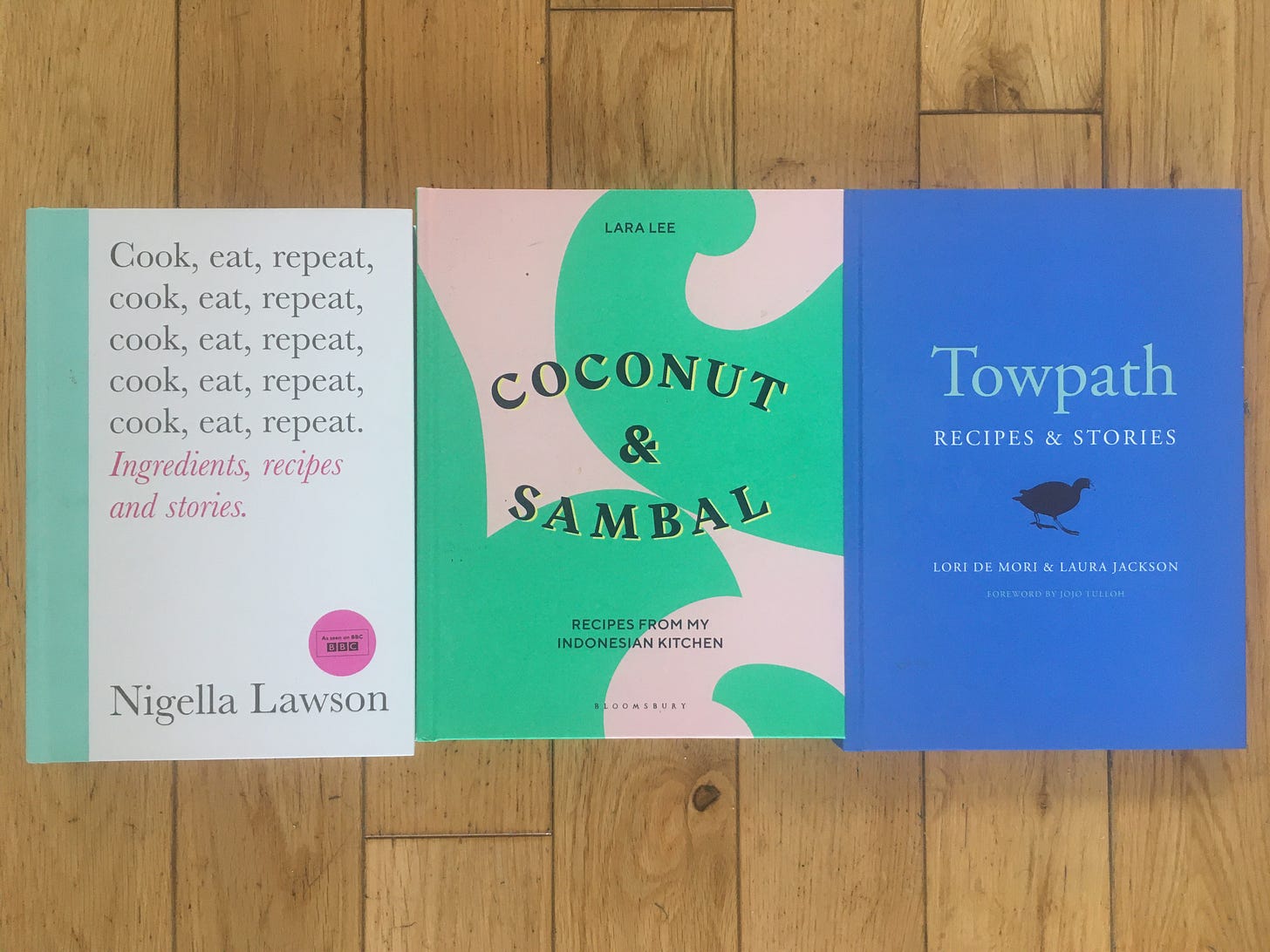Paid subscribers can access all of our Vittles Restaurants content – with new features published every Friday – plus the entire back catalogue, for £45/year.
One of the few pleasures of the last few weeks has been suddenly making time for myself to do things other than work; time which I’ve found unexpectedly, like a big bag of Democratic mail-in ballots in the corner of the counting room. I’ve mainly been finding the time to read, which of course is a type of work too, albeit a far more pleasurable one. In this strange pre-Christmas season there has been a glut of cookbooks too good to ignore: Ottolenghi and Ixta Belfrage’s Flavour, the new Towpath book by Lori de Mori and Laura Jackson, which appealingly cites ‘Lea and Perrins’ alongside ‘Lee, Jeremy’ in the index, and Cook, Eat, Repeat by Nigella Lawson. I must admit unlike other food writers I’m not a particularly voracious reader or user of cookbooks, but those I do read I prefer to read for their writing rather than recipes. In a book like Richard Olney’s Simple French Food, there is a philosophy sown through it with a trussing needle, on how to cook, how to eat, and how to live; a certainty that things should be done the correct way or not done at all. Or in Thom Eagle’s Summer’s Lease, as in his recipe-less First, Catch, there is a sense of rhythm, of the kitchen and of seasons, of how cooking can be a communion with nature and the world around us.
Which is to say, I’ve mainly been reading Cook, Eat, Repeat to soak up Lawson’s romantic prose, which here is untrammeled by ungenerous word counts or a sense of what sells newspapers: a gorgeous 5000+ essay on that princely condiment, the anchovy, for not much reason other than to introduce a couple of anchovy recipes. In the opening essay, as in some of the recipes, such as the take on Ash Sarkar’s (or is it Ash Sarkar’s mum’s?) now notorious fish finger bhorta, there is a sense that the title ─ while extremely catchy ─ is something of a misnomer. We never truly repeat any recipe because if we did then we would be doing it wrong. The physical recipe is just one bus stop on a route that never quite ends; every recipe is an iteration on something else, every recipe will be iterated on by those who read it. In the bhorta for instance, the recipe makes the addition of pink onions (judicious) and substitutes out mustard oil (controversial), and all of a sudden ownership of a childhood Bengali-assimilation food is temporarily transferred, unlikely, to Nigella Lawson, which will then be transferred to whoever makes the dish next. Having made one version, I’m sure I will make the other, and then my own version, unbalanced towards my own unsubtle palate, which tends to deface recipes with the brutal additions of chillis and various peppercorns.
So what has all of this got to do with Vittles? A few things have happened recently which have made me slightly rethink this newsletter. I’m well aware that this landing in your inbox is an intimate privilege I have. In a world which is already depressing enough, I’m not sure it’s my job to always depress you further. I was so heartened by the reaction to last week’s regional chippy guide, which seemed to inspire what can only be described as ‘joy’ for a lot of people, even those who don’t normally read food writing. I think it’s something I could be doing more of, given we are (in the UK at least) about to go into a lockdown of an indeterminate length.
While we’re all cooking again, and in need of things to preoccupy us, I’ve been commissioning writers and chefs to do their own iterations of recipes. Over the next few weeks, and possibly for as long as lockdown goes on, I’ll be publishing small essay-recipes, each one on the theme of a cookbook with an iteration on the recipe contained within. It wont be quite as ambitious as an idea I’ve had for a while (which Lawson shares) of an endlessly iterative recipe, like the book in Borges’s Garden of Forking Paths, but hopefully this type of writing will have us engaging with our cookbooks in a more imaginative way, reminding us that cooking from a recipe is always a collaboration, an act of translation. And on a personal level, it will give me some time off from editing 3000 word essays on failing supply chains.
This not-quite-full-season will start next week, with Alex Jackson on Patience Gray’s Honey From a Weed. Pitches will not be open for this as I am commissioning everything myself, but I do hope you enjoy reading them. Normal service will continue whenever normal service continues.
Jonathan Nunn is a writer based in London and the editor of Vittles. You can find him on Twitter as @demarionunn and you can find Vittles on both Twitter and Instagram.




This sounds lovely! Looking forward to reading.